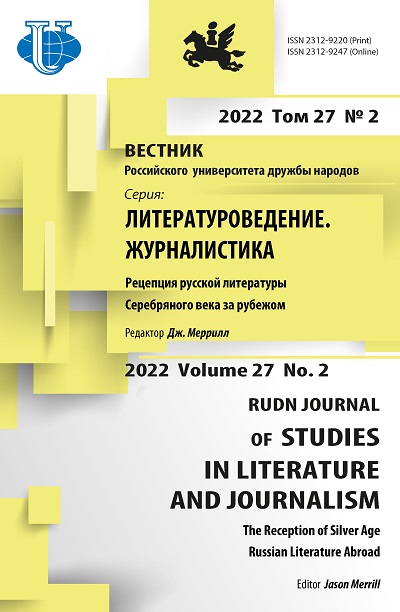М.М. Бахтин как носитель русской традиции: современное восприятие идей Бахтина в Китае
- Авторы: Ма М.1,2
-
Учреждения:
- МГУ-ПИИ в Шэньчжэне
- Московский государственный университет имени М.В. Ломоносова
- Выпуск: Том 27, № 2 (2022): РЕЦЕПЦИЯ РУССКОЙ ЛИТЕРАТУРЫ СЕРЕБРЯНОГО ВЕКА ЗА РУБЕЖОМ
- Страницы: 359-370
- Раздел: Литературоведение
- URL: https://journals.rudn.ru/literary-criticism/article/view/31461
- DOI: https://doi.org/10.22363/2312-9220-2022-27-2-359-370
- ID: 31461
Цитировать
Полный текст
Аннотация
Проведены исследования состояния восприятия идей М.М. Бахтина в современном Китае. Выбор данного периода объясняется тем, что в последние десятилетия китайские исследователи начали поиски истоков идей Бахтина. Если некоторые отстаивали идею западного происхождения теории Бахтина, то большинство китайских ученых связывало идеи Бахтина с контекстом славянской традиции и православия, в частности, с идеей соборности. Это, безусловно, открыло перед нами новый простор для дальнейших исследований. Автор дает обобщенную характеристику изучения связей идей Бахтина с русской традицией, отмечая, что исследования китайских ученых по этому направлению сосредоточены на разных аспектах: одни обсуждают влияние соборности на творческое сознание Достоевского, структуру художественных произведений и полифоническую идею Бахтина, другие пишут о карнавале как о русском явлении у Бахтина, третьи говорят о христианской антропологии и психологии в творчестве Бахтина, четвертые делают сравнительный анализ идей Бахтина как русского мыслителя и западной философии. Показано, как М.М. Бахтин воспринимался извне, из иной перспективы и культурной традиции, благодаря чему его идеи начинают обогащаться новыми смыслами и коннотациями. Автор приходит к выводу о том, что концепция «соборность» имеет сходство с исторически сложившимся как традиционная ценность китайского народа коллективизмом, поэтому китайские ученые легко приняли концепцию «соборность».
Ключевые слова
Об авторах
Мэнцю Ма
МГУ-ПИИ в Шэньчжэне; Московский государственный университет имени М.В. Ломоносова
Автор, ответственный за переписку.
Email: 2584786603@qq.com
ORCID iD: 0000-0002-9381-6943
аспирант кафедры истории русской истории
Китай, 518172 Шэньчжэнь, район Лунган, ул. Гоцзидасюэюань, 1; Российская Федерация, 119991, Москва, Ленинские Горы, 1Список литературы
- Бахтин М.М. Собрание сочинений: в 7 т. Т. 6: Проблемы поэтики Достоевского, 1963. Работы 1960-1970 гг. М.: Русские словари; Языки славянской культуры, 2002
- Бочаров С.Г. Об одном разговоре и вокруг него // Новое литературное обозрение. 1993. № 2. С. 71-72
- Ван Чжигэн. Общий смысл Достоевского и Бахтина // Литература и культура. 2020. № 3. С. 34-41. [王志耕. 巴赫金与陀思妥耶夫斯基的共同意义. 文学与文化. 2020. 第 3 期. 34-41 页.]
- Ван Чжигэн. Соборность и полифоническое искусство Достоевского // Обозрение зарубежной литературы. 2003. № 1. С. 110-120. [王志耕. “聚合性”与陀思妥耶夫斯基的复调艺术. 外国文学评论. 2003. 第 1 期. 110-120 页.]
- Вэнь Хао. Исследование принципа человеческой субъективности Бахтина. Чанша: Хунаньский пед. ун-т, 2007. [文浩. 巴赫金主体性思想初探. 长沙 湖南师范大学 2007.]
- Гуань Юеэ. Православная концепция «соборность»: с точки зрения полифонического романа и теории структурной поэтики // Исследование зарубежной литературы. 2018. № 2. С. 55-63. [管月娥. 东正教的“聚合性”理念与复调小说和结构理论. 外国文学 研究. 2018. 第 2 期. 55-63 页.]
- Есаулов И.А. Категория соборности в русской литературе. Петрозаводск: Изд-во Петрозавод. ун-та, 1995.
- Захаров В.Н. Проблемы исторической поэтики. Этнологические аспекты. М.: Индрик, 2012.
- Кожинов В.В. Бахтин и его читатели. Размышления и отчасти воспоминания // Диалог. Карнавал. Хронотоп. 1993. № 2-3. С. 120-134.
- Кожинов В.В. Победы и беды России. М.: Алгоритм, 2000.
- Лосский Н.О. История русской философии. М.: Советский писатель, 1991.
- Махлин В.Л. Бахтин и Запад (Опыт обзорной ориентации) // Вопросы философии. 1993. № 3. С. 94-114
- Сун Чуньсян. Религиозный аспект феномена карнавала: исследование теории карнавала Бахтина. Пекин: Народный университет Китая, 2008. [宋春香. 狂欢的宗教之维- 巴赫金狂欢理论研究. 北京 中国人民大学 2008.]
- Сяо Цзиньюй. Металингвистика М.М. Бахтина. Шанхай: Изд-во Жэньминь, 2007. [萧净宇. 超越语言学. 上海 上海人民出版社 2007.]
- Хомяков А.С. Полн. собр. соч. Т. 2. М., 1900
- Цзи Минцзюй. М.М. Бахтин и славянофильский характер его теории // Русское литературоведение. 2008. № 1. С. 48-53. [季明举. 巴赫金及其理论的斯拉夫性质. 俄罗斯文艺. 2008. 第 1 期. 48-53 页.]
- Цзи Минцзюй. Утопические диалоги // Русское литературоведение. 2002. № 3. С. 22-25. [季明举. 对话乌托邦. 俄罗斯文艺. 2002. 第 3 期. 22-25 页.]
- Чжан Синь. Бахтин и русская религиозная философия // Культура и поэтика. 2008. № 2. С. 278-291. [张欣. 巴赫金与俄罗斯宗教哲学. 文化与诗学. 2008. 第 2 期. 278-291 页.]
- Чжан Синь. Влияние русской философии на создание теории романа Бахтина. Пекин: АОНК, 2003. [张欣. 从对话看宗教因素对巴赫金小说理论的影响. 北京 中国社会科学院研究生院 2003.]
- Чжан Цзе. Соборность в творчестве Ф.М. Достоевского // Исследование зарубежной литературы. 2010. № 5. С. 73-78. [张杰. 陀思妥耶夫斯基小说创作艺术的“聚合性”. 外国文学研究. 2010. 第 5 期. 73-78 页.]
- Чжоу Вэйчжун. Амбивалентность карнавала и две природы Иисуса Христа // Вестник Северо-восточного пед. ун-та. 2008. № 3. С. 118-124. [周卫忠. 狂欢人格的双 重性与基督位格的双重性. 东北师大学报. 2008. 第 3 期. 118-124 页.]
- Чэн Цзиньхай. Религиозная сущность отношений между автором и героем в теории полифонии // Вестник Чэньчжоуского пед. ун-та. 2002. № 4. С. 55-59. [程金海. 复调理论中作者与主人公关系的宗教意味. 郴州师范高等专科学校学报. 2002. 第 4 期. 55- 59 页.]
- Ян Янь. Полифония в православном понимании // Критика идей христианства. 2013. № 16. С. 147-160. [杨砚. 东正教信仰中的复调诗学. 基督教思想评论. 2013. 第 16 期. 147-160 页.]
Дополнительные файлы















